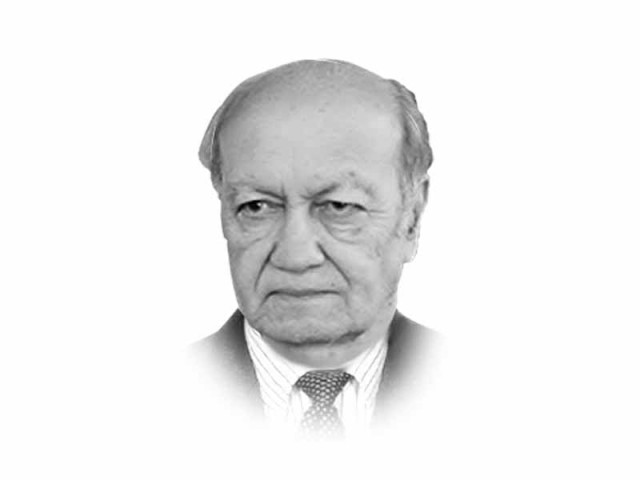Unique US presidential election
As opposed to Trump, Hillary Clinton has a deep understanding of the world and is very familiar with South Asia

The writer is a retired lieutenant general of the Pakistan Army and a former federal secretary. He has also served as chairman of the Pakistan Ordnance Factories Board
Trump’s nomination has brought to the fore serious lacunas in the American election system that needs major correction. But despite these weaknesses, he commands a huge following and there are significant reasons for that. Trump is the first presidential candidate who after a long time is giving voice to the frustrations of white Americans more than anyone else. More significantly, he has articulated these by breaking all barriers of political correctness and that has found a large audience. His hard-hitting speeches resonate with white Americans and especially those with a conservative mindset. He is exploiting the weakness of the current US economic policies that have given rise to the wide gap that exists between the income of the two per cent rich and the remaining vast majority whose standard of living has been going down and finding it difficult to balance their budgets. The appeal of Trump is more in rural and southern America than in major urban centres. In essence, he is challenging the status quo by taking on the power centres within political parties and the establishment that supports the status quo. This appeals to the disenchanted and are willing to give him a try. It is apparent that he has no hard principles and shows considerable flexibility in taking position on major issues if they come under severe criticism. And as a reputed columnist described him, he goes by the mood of the crowd and says things to please them rather than pursue consistent policies on major issues.
As opposed to Trump, Hillary Clinton has a deep understanding of the world and is very familiar with South Asia. In her capacity as Secretary of State in the Obama Administration, she had frequent dealings with Pakistan and knows the dynamics of the region. She, too, would strengthen the strategic partnership with India to jointly countervail China’s growing influence in the region. With regard to Pakistan, Hillary is likely to keep up the pressure, especially on issues related to Afghanistan. It appears she stands a better chance of winning the elections, but suffers from some serious shortcomings that could stand in her way. She has a credibility problem and is not universally trusted; that is especially the case each time there is a scandal that reinforces the impression. The recent FBI report on her private email server would further keep the issue alive and provide her detractors the opportunity to project her in bad light. Moreover, Hillary represents the status quo and is generally considered as pro-establishment and pro-corporate America. Those who see her negatively are likely to either vote for Trump or elect to be absentee voters.
For Pakistan, the election of either candidate is unlikely to make much difference. Apart from areas of divergence between the US and Pakistan on issues related to India and Afghanistan, there will be additional pressure on us due to the China factor. Pakistan’s close strategic relationship with China and the implementation of the CPEC has not been viewed positively by Washington and there are misgivings that it provides China new avenues to expand its influence and create additional strategic space in a critical region. Pakistan and China have already built in measures to secure the corridor and are emphasising that the CPEC is primarily an economic project and not directed against any country. Apart from the criticality of Pakistan in the Afghan peace process and China-Pakistan collaboration, there will not be many other areas of immediate interest for the Americans. But Pakistan has an intrinsic importance that cannot go unrecognised. It is an important Muslim country of 200 million people located in a strategic area. And one of the few Muslim countries set on the democratic course, even if it is fragile and in transition. It is a nuclear power and its armed forces are highly professional and battle-hardened. The build-up of fissile material does attract attention but the US realises that it has to accept this as long as India keeps building its stocks. Despite the differences, Pakistan’s national interests demand that it should maintain a collaborative relationship with the US. Experience has shown it is not advisable to lean heavily on any one country, even if it is as reliable a friend as China. In fact, the Chinese have been advising us to improve relations with our neighbours. Besides, the US is an important trading partner and there is a potential of increasing the share of its market provided we take concrete measures to improve the quality of our producta and widen the range of our products.
Irrespective of which candidate wins the elections, Pakistan’s future relations with the US and the rest of the world will be determined largely by how we are able to consolidate our democracy, improve economic performance and achieve internal stability and cohesiveness.
Published in The Express Tribune, September 7th, 2016.
Like Opinion & Editorial on Facebook, follow @ETOpEd on Twitter to receive all updates on all our daily pieces.















COMMENTS
Comments are moderated and generally will be posted if they are on-topic and not abusive.
For more information, please see our Comments FAQ